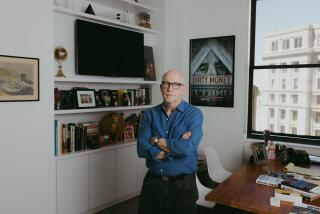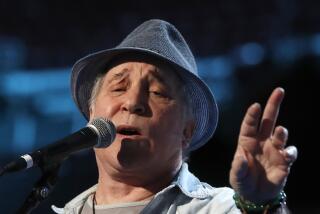SIMON TAKES ‘GRACELAND’ TO AFRICA
- Share via
HARARE, Zimbabwe — Paul Simon, taking his historic “Graceland” tour as close to South Africa as conscience and laws allowed, stood quietly at the rear of the huge outdoor stage Sunday as jazz trumpeter Hugh Masekela stepped to the microphone.
Masekela, who has lived in exile for almost three decades because of his opposition to apartheid in his native country, looked out at the crowd of 14,000, hundreds of whom had traveled here from neighboring South Africa.
He raised his right arm in a symbol of determination and began singing his “Bring Him Back Home,” a call for the release in South Africa of imprisoned black leader Nelson Mandela: “Bring back Nelson Mandela / Bring him back to Soweto (township). . . . “
Later, Simon watched again as Miriam Makeba, another South African exile, sang a slow, deliberate version of Masekela’s plaintive “Soweto Blues.” Performing in Harare for the first time in almost 30 years, she introduced the song with such intensity that her whole body seemed to shake with emotion.
At the end of the two-hour concert, which was taped for a Showtime cable TV special, Simon joined the 24 other musicians (all black, and all but one born in South Africa) in singing “God Bless Africa,” the song that is regarded in much of the continent as the black national anthem.
It was a moving scene as blacks and whites in an audience that was about 80% black rose and sang along: the people of a land that just gained independence in 1980 longing for self-determination for their neighbors.
In these moments, the “Graceland” tour--which begins a five-night stand at the Universal Amphitheatre March 3--seemed more like a political rally than a concert.
Yet, Simon has been criticized repeatedly in some quarters for not being political enough. Initially, the charges centered around the question of whether the veteran singer-songwriter broke a U.N. committee-sponsored cultural boycott by recording parts of his best-selling album in South Africa.
While Simon’s detailed defense of his intent in recording with the South Africans has caused that issue to be largely dropped, his motives have been questioned on other grounds at sometimes stormy press conferences in Europe held in conjunction with the tour.
The debate frequently centers on arguments that Simon should have written some “protest” songs on the “Graceland” album. He in turn questions the effectiveness of most protest music, and feels the idea of a white artist from the U.S. recording and touring with black South Africans is itself an effective statement against apartheid.
At the press conference at his hotel here before his two weekend concerts, some speakers raised the question of Simon’s motives in such sweeping and accusatory tones that many of the fellow writers groaned--or laughed--aloud.
Things got so intense that the usually deliberate, soft-spoken Simon snapped back to one questioner, “Both of your statements are so filled with misinformation that I wish you would rethink them. But since you probably won’t, I’ll respond. . . . “
There was, however, only praise for Simon on Saturday and Sunday at Rufaro Stadium. As the audience, which included Zimbabwe’s President Canaan Banana, waited through performances by two popular local groups, many spoke with pride about Simon’s helping to bring international attention to the music of the area.
Of the nearly four-dozen people interviewed over the two days, none had any criticism of Simon’s recording in South Africa, and none saw his actions as exploitative. As the “Graceland” portion of the show began Saturday (when the sellout crowd of 20,000 appeared to be about 60% black), a second theme also emerged from the informal interviews.
Local residents, black and white, repeatedly pointed to the relaxed atmosphere: the harmony between races in a country where the transfer of power from a white minority government to a black majority had been viewed by whites with trepidation.
“This is the biggest multiracial gathering we’ve had since the independence celebration, and it is reminder of the progress that’s been made here,” said Godfrey Chiyamgwa, 29, a sales representative who is black.
“This stadium is often filled on Sundays for soccer matches. The games attract mostly a black audience. . . . This is the first chance (for the world) to see how well we all get along. The music brought us together in one place and it feels good.”
Rufaro Stadium is normally used for soccer matches. There have been other concerts here, most notably Bob Marley’s performance at the country’s 1980 independence celebration.
The facility is about five miles from downtown. Formerly known as Salisbury, Harare is the capital of Zimbabwe, a socialist state about the size of California near the southeast tip of Africa.
There’s a strong Western flavor in the city. All the signs are in English, and the government-owned Sheraton hotel is a lavish skyscraper that would brighten a chamber of commerce brochure anywhere.
Billboards in the stadium proclaim such Western products as Coca-Cola, Colgate and Brylcreem.
As an estimated 10,000 fans stood on the grass in front of the stage in the blistering heat Saturday and another 10,000 sat in the shade of a concrete grandstand behind them, the scene looked much like an outdoor concert in Southern California. The teen-age fans on the grass danced and cheered each song mightily. Yet what was happening on stage was unique by any standard: a breakthrough musically, culturally and politically.
Simon and the “Graceland” band took the stage shortly after 3 p.m. and showcased songs from the album (he’s using only two of his older songs on the tour, “Mother and Child Reunion” and “The Boxer”), but in a revue format, he also generously spotlighted solo performances by Masekela, Makeba and the Joseph Shabalala-led Ladysmith Black Mambazo, the happiest, most cheerful gospel group imaginable.
The many varieties of South African music--as filtered through Simon--are even more inviting live than on “Graceland,” a nominee for the best-album Grammy.
It’s a wonderfully appealing mix of the familiar good-time spirit of ‘50s R&B; (Simon even segues one tune into the Del Vikings’ old “Whispering Bells” to prove the point) and the quaint, accordion-accented flavor of such regional American forms as Zydeco. The music is brightened by a harder-than-expected guitar line and frequently surprising, exotic percussion touches.
The biggest crowd-pleaser--amid all the talk about social commentary and protest songs--turned out to be the album’s zaniest tune, the highly danceable “You Can Call Me Al.” The response was so strong that Simon and his nine-piece band, led by guitarist Ray Phiri, repeated the number. And the dancing on the grass was even more joyful.
Sitting high in the concrete grandstand Saturday, Godfrey Chiyamgwa, the local sales representative, pointed to the interracial celebration on the field. “Look at how they get along. I hope South Africans learn a lesson from what we’re doing here. I hope they learn a lesson in time. . . . “
Backstage after Sunday’s show, Simon was enthusiastic. “I still wish we could have found a way to take this show into South Africa, which would have been the most dramatic possible statement. But that was impossible for several reasons. Still, what happened today will be heard. I’m sure tapes will be smuggled in. . . . The message will be heard.”
More to Read
The biggest entertainment stories
Get our big stories about Hollywood, film, television, music, arts, culture and more right in your inbox as soon as they publish.
You may occasionally receive promotional content from the Los Angeles Times.










